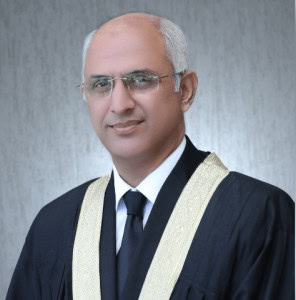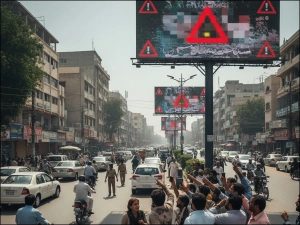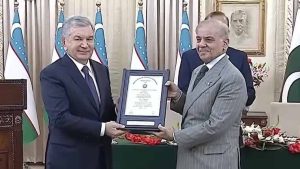Islamabad High Court (IHC) senior puisne judge, Justice Mohsin Akhtar Kayani, on Friday ordered live streaming of all missing persons cases to “facilitate public awareness and understanding of important legal issues.”
This decision came as Justice Kayani resumed hearing a petition seeking the recovery of missing Kashmiri poet Ahmed Farhad Shah.
During the hearing, Justice Kayani summoned sector commanders from the Inter-Services Intelligence (ISI) and Military Intelligence (MI), the director of the Intelligence Bureau (IB), Law Minister Azam Nazeer Tarar, and the defence, law, and interior secretaries for the next session on May 29. The Human Rights Commission of Pakistan had called for Shah’s immediate release, alleging his abduction from his home on May 15.
Shah’s wife filed a petition in the IHC the same day, requesting his recovery and the identification, investigation, and prosecution of those responsible for his disappearance.
On May 16, Justice Kayani had requested a report from the defense secretary on the alleged involvement of intelligence agencies in Shah’s disappearance. Earlier this week, the judge expressed dissatisfaction with the defense secretary’s “working,” urging intelligence agencies to clear their name from abduction allegations.
The court demanded an explanation from the defense secretary by 3 PM the same day, only to be informed that Shah was not in ISI custody. Consequently, Justice Kayani summoned the defense and interior secretaries to appear in person the following day.
On Tuesday, Attorney General of Pakistan (AGP) Mansoor Usman Awan submitted a report from the defense secretary, citing his illness. The judge insisted that the defense secretary must appear at the next hearing. Justice Kayani then ordered AGP Awan to recover the missing poet within four days, which Awan took full responsibility for. Senior Superintendent of Police (SSP) Jameel Zafar informed the court that he could not provide an ISI sector commander’s statement due to the latter’s absence.
During the latest hearing, AGP Awan and Islamabad Inspector General (IG) Ali Nasir Rizvi appeared before the court. The court order stated: “The AGP was asked whether law enforcement institutions, including ISI and MI, were performing their duties under any law.” AGP Awan explained that the ISI is directly accountable to the prime minister, while the MI is associated with the defense secretary and the armed forces.
The court emphasized the necessity for all institutions to work within their constitutional limits. However, a comparative assessment of the ISI’s performance with the police, FIA, and CTD could not be made until the court received detailed briefings on the operational practices of the ISI and MI, including their investigation and inquiry methods. The defense secretary was summoned in his personal capacity to provide a written explanation on these matters.
The court noted that the issue of missing persons is currently a significant public interest issue, with no legislative action taken by Parliament to hold law enforcement agencies accountable. The court criticized the limited effectiveness of the Commission of Inquiry on Enforced Disappearances and emphasized the need to understand the internal discretionary and administrative matters of the agencies involved.
Justice Kayani subsequently appointed AGP Awan and the petitioner’s counsel, Advocate Imaan Zainab Mazari-Hazir, to nominate experts on the matter to the court. He also appointed the secretary of the Pakistan Federal Union of Journalists (PFUJ) and senior journalist Hamid Mir as judicial assistants in the case.













